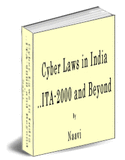In its bid to improve efficiency of the TDS system, the Tax authorities
in India have mandated that Corporate assesses shall file the TDS return only
in a new e-TDS format.
The new format envisages that the particulars of return would be prepared in
the form of a text file with a specified data structure. The electronic file
thus prepared would be stored in a floppy or a CD and enclosed to a letter
signed by the assessee.
What needs to be noted is that the procedure involves writing a covering
letter on paper enclosing an electronic document which is not authenticated by
means of a digital signature as is prescribed under the ITA-2000. The content
of the Electronic file in the CD/Floppy are confirmed by the control total
figures stated in the paper.
While one appreciates the need for the electronic filing of the return which
facilitates quick processing at the tax authorities end, it is to be noted
that the system suggested is not in conformity with the laws of the land
namely the ITA-2000 which prescribes the manner in which electronic documents
can be authenticated.
In the event the electronic files are manipulated, the covering letter may not
provide enough legal support to either the assesee or the department to prove
or disprove the information.
This is a peculiar situation when one arm of the Government has initiated a
procedure as mandatory and the said procedure is non Cyber Law Compliant. This
could lead to a bad precedent of creating a quasi legal status for the
authentication of electronic documents through covering letters.
The department could have simplified the process by at least insisting that
the covering letter should contain the MD5 hash of the enclosed electronic
file and it would have in principle achieved the purposes for which digital
signatures were introduced in the country though it would still leave a small
lacuna since ITA-2000 does not clearly support even this type of
authentication..
The hash functionality is simple and the utilities are available free of
cost and it would have been possible to overcome the lack of digital
signatures with this "Physical Signature with hash code" as a means of
authentication. Since this can satisfy the functionality of the digital
signature as envisaged in the ITA-2000, perhaps Courts could have accepted
this as equivalent to digital signature.
I urge the department to immediately notify the change in the system and let
the current year return to be filed as in the past through paper system.
Naavi
March 21, 2004
Procedure for E-TDS
Recommended
Data Structure
